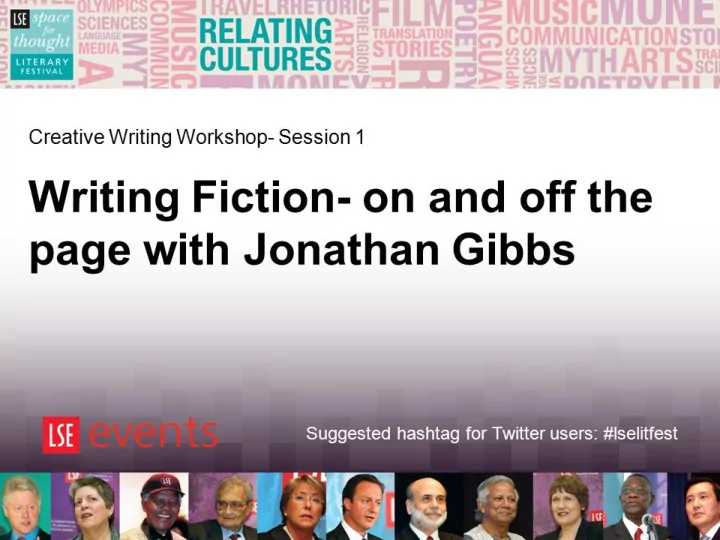

Jonathan Gibbs / http://tinycamels.wordpress.com / Twitter: @tiny_camels Writing fiction on and off the page
Jonathan Gibbs / http://tinycamels.wordpress.com / Twitter: @tiny_camels The creative writer does the same as the child at play. He creates a world of phantasy which he takes very seriously – that is, which he invests with large amounts of emotion – while separating it sharply from reality. Sigmund Freud, Creative Writers and Day-Dreaming
Jonathan Gibbs / http://tinycamels.wordpress.com / Twitter: @tiny_camels We recreate, with minor and for the most part unimportant changes, the vivid and continuous dream the writer worked out in his mind (revising and revising until he got it right) and captured in language so that other human beings, whenever they feel like it, may open his book and dream that dream again. John Gardner, On Becoming A Novelist
Jonathan Gibbs / http://tinycamels.wordpress.com / Twitter: @tiny_camels I have the feeling that in the back of your mind there’s a little writer who writes while you’re doing other things. Neil Simon
Jonathan Gibbs / http://tinycamels.wordpress.com / Twitter: @tiny_camels Don’t look back until you’ve written an entire draft, just begin each day from the last sentence you wrote the preceeding day. This prevents those cringing feelings, and means that you have a substantial body of work before you get down to the real work which is all in the edit. Will Self, Rules for Writers The Guardian. 23/02/2010
Jonathan Gibbs / http://tinycamels.wordpress.com / Twitter: @tiny_camels The situation comes first. The characters – always flat and unfeatured, to begin with – comes next. once these things are fixed in my mind, I begin to narrate. I often have an idea of what the outcome may be, but I have never demanded of a set of characters that they do things my way. On the contrary, I want them to do things their way. In some instances, the outcome is what I visualized. In most, however, it’s something I never expected. Stephen King, On Writing
Jonathan Gibbs / http://tinycamels.wordpress.com / Twitter: @tiny_camels The writer works out plot in one of three ways: by borrowing some traditional plot or an action from real life; by working his way back from his story’s climax; or by groping his way forward from an initial situation. Since usually one does not work out plot all at once, but broods over it, mentally trying alternatives, taking notes, narrying the idea in the back of one’s mind as one reads or does one’s laundry, working and reworking it for days or months or, sometimes, years, one may in practice work both backward and forward or even in all three of the possible ways simultaneously. John Gardner, The Art of Fiction
Jonathan Gibbs / http://tinycamels.wordpress.com / Twitter: @tiny_camels First thoughts – from The Art of Writing Fiction by Andrew Cowan Think of the person you are closest to in the world, the person whose life you know the most intimately. You are going to write for fifteen minutes, describing what you imagine that person to be doing (and thinking and feeling) at this very moment. Write in the present tense, and address it to ‘you’ – eg You are humming to yourself. Standing on tip-toe you are scanning the top shelf of the cupboard for the pistachio nuts I hid there last night. -You are free to write illegibly and ungrammatically -You are free to be clumsy and clichéd -You are free to repeat or contradict yourself -You are free to write rubbish -You are free to write anything -You are free to go completely off the point - BUT you must write without a moment’s pause for exactly fifteen minutes No one is going to read what you write – not your teacher or your classmates, and especially not the person you’re describing.
Jonathan Gibbs / http://tinycamels.wordpress.com / Twitter: @tiny_camels Writing Fiction – on and off the page • John Gardner, On Becoming A Novelist (Norton – US edition only) • John Gardner, The Art of Fiction (Vintage – US edition only) • Stephen King, On Writing (New English Library, £9.99) • Andrew Cowan, The Art of Writing Fiction (Longman, £16.99) • Rules for writers: search ‘Guardian Rules for Writers’ • www.nanowrimo.org National Novel Writing Month (November) • http://www.booktrust.org.uk/books-and-reading/short-stories/prizes/ • http://www.titaniawrites.blogspot.com/ List of UK and Irish magazines (print and online) that print short stories.
Recommend
More recommend